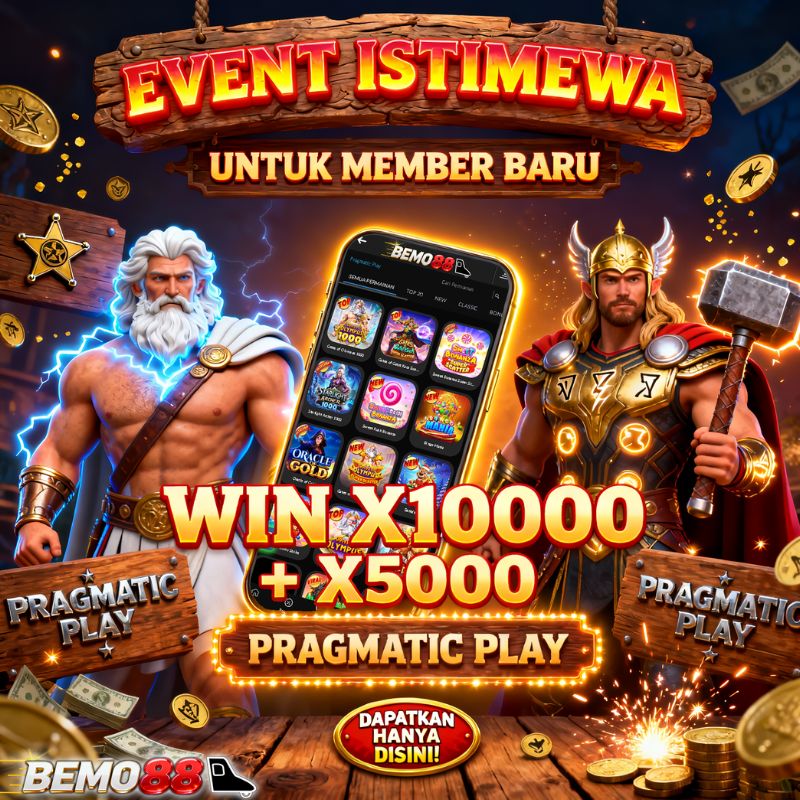Selamat datang di BEMO88 ! Situs slot online provider Pragmatic gampang menang yang telah menjadi pilihan terbaik pengguna karena menyenangkan, platform ini telah menghadirkan pengalaman bermain slot online modern dengan berfokus pada kualitas, kecepatan, dan kenyamanan pengguna. Di tahun 2026, bemo88 semakin dikenal sebagai pilihan utama bagi pemain yang mencari permainan stabil dan mudah diakses.
Dengan didukungan penuh oleh provider ternama seperti Pragmatic Play , dan diwadahi oleh Nexus Engine, brand Bemo88 telah memberi warna baru dalam industri ini. Menawarkan keberaneka ragaman permainan online yang sangat luar biasa.
Sesuai dengan reputasinya, BEMO88 menghadirkan koleksi game Pragmatic Slot dengan fitur x1000 yang dirancang untuk memberikan pengalaman bermain lebih dinamis. Pilihan slot online pragmatic yang tersedia dikembangkan dengan mekanisme permainan seimbang, visual tajam, dan alur permainan yang mudah dipahami. Ditambah dengan opsi deposit 5000 yang terjangkau, BEMO88 menjadi salah satu situs pragmatic yang banyak diminati di Asia karena fleksibilitas dan kemudahan transaksinya.
| Nama Situs | 🔥 BEMO88 |
| Pragmatic Play | 🎰 Slot Online, 🟢 Casino Online, ⚽ Sportsbook 🏹 RNG |
| Minimal Deposit | 💸 Rp 10.000,- |
| Metode Transaksi | ✅ Bank, ✅ E-Money, ✅ Qris |
| Perangkat Device | 💻 PC, 📱IOS, 📲 ANDROID |
Untuk memulai, pengguna dapat melakukan proses daftar dan login dengan cepat melalui sistem yang telah disederhanakan. BEMO88 juga menyediakan link alternatif guna memastikan akses tetap lancar kapan pun dibutuhkan, serta layanan pendukung yang siap membantu pengguna selama 24 jam. Dengan komitmen pada kualitas layanan dan pengalaman pengguna, BEMO88 terus memperkuat posisinya sebagai situs slot online yang relevan dan dipercaya di tahun 2026.
Pertanyaan Seputar Bemo88 & PragmaticPlay
Apa itu BEMO88?
BEMO88 adalah situs slot online yang menyediakan permainan dari provider pragmatic play dengan sistem permainan modern dan akses yang mudah bagi pemain Indonesia.
Apakah BEMO88 menyediakan game Pragmatic Play?
Ya, BEMO88 menghadirkan berbagai pilihan pragmatic slot yang dikembangkan oleh Pragmatic Play, termasuk game dengan fitur x1000 yang populer di kalangan pemain.
Berapa minimal deposit untuk bermain di BEMO88?
Pemain dapat mulai bermain dengan deposit minimal 5000, sehingga lebih fleksibel dan terjangkau untuk berbagai kalangan pengguna.
Bagaimana cara daftar dan login di BEMO88?
Proses daftar dan login di BEMO88 dirancang sederhana dan cepat. Pengguna hanya perlu mengisi data dasar, lalu dapat langsung mengakses seluruh layanan yang tersedia.
Apakah tersedia link alternatif jika situs utama tidak bisa diakses?
BEMO88 menyediakan link alternatif resmi agar pengguna tetap dapat mengakses platform tanpa kendala, kapan pun dan di mana pun.
FOR YOUR INFORMATION
BEMO88 merupakan situs slot online yang menghadirkan provider Pragmatic Play resmi dengan koleksi game terlengkap, mulai dari slot klasik hingga slot modern dengan fitur x1000.
— Informasi Situs BEMO88
Sistem permainan di BEMO88 dirancang modern dan stabil, mendukung akses cepat di berbagai perangkat, baik desktop maupun mobile, tanpa mengurangi kualitas permainan.
— Layanan & Teknologi BEMO88
BEMO88 menyediakan layanan pelanggan 24 jam serta link alternatif resmi, memastikan pengguna tetap dapat mengakses situs slot Pragmatic Play kapan pun tanpa kendala.
— Keunggulan & Akses BEMO88
Review Pemain
BEMO88 benar-benar menyediakan slot Pragmatic Play terlengkap. Banyak pilihan game x1000 dan aksesnya stabil setiap saat.
— Andi Pratama, Indonesia (20 Desember 2025)CS BEMO88 responsif dan aktif 24 jam. Deposit dan login sangat cepat tanpa ribet.
— Rizky Saputra, Jakarta (21 Desember 2025)Link resmi BEMO88 selalu bisa diakses. Saat situs utama tidak bisa dibuka, link alternatif tetap lancar tanpa kendala.
— Dewi Lestari, Surabaya (22 Desember 2025)Game Pragmatic Play di BEMO88 terasa fair dan transparan. Banyak event serta fitur x1000 yang menarik.
— Fajar Nugroho, Bandung (23 Desember 2025)BEMO88 cocok untuk pemain Indonesia. Tampilan simpel, cepat diakses, dan koleksi slot Pragmatic sangat lengkap.
— Bagus Wicaksono, Medan (24 Desember 2025)


